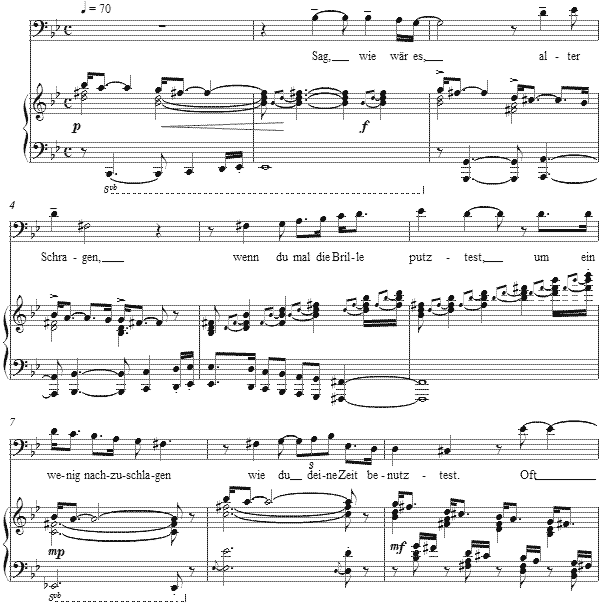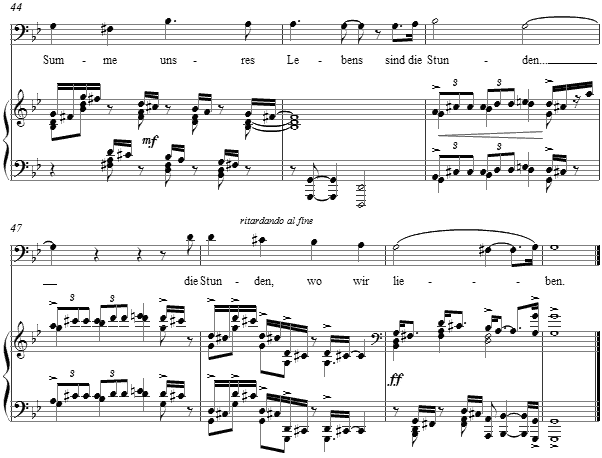Music and Texts of GARY BACHLUND
Vocal Music | Piano | Organ | Chamber Music | Orchestral | Articles and Commentary | Poems and Stories | Miscellany | FAQs
Summa Summarum - (2009)
Wilhelm Busch
for baritone and piano
Sag, wie wär es, alter Schragen,
Wenn du mal die Brille putztest,
Um ein wenig nachzuschlagen,
Wie du deine Zeit benutztest.
Oft wohl hätten dich so gerne
Weiche Arme weich gebettet;
Doch du standest kühl von ferne,
Unbewegt, wie angekettet.
Oft wohl kams, dass du die schöne
Zeit vergrimmtest und vergrolltest,
Nur weil diese oder jene
Nicht gewollt, so wie du wolltest.
Demnach hast du dich vergebens
Meistenteils herumgetrieben;
Denn die Summe unsres Lebens
Sind die Stunden, wo wir lieben.[ 4 pages, circa 3' 00" ]
Wilhelm Busch
Tell how it was, you silly old fool,
When you wipe off your filthy lenses,
And think a little more clearly now
That in youth you had lost your senses.
Often you could have quite happily
Found yourself sweetly bedded,
But you stood off sullen, apart and cold,
Unmoved and chained, but not wedded.
Often it seems you threw life away,
Detached from the loveliest of hours.
Only because you would not dare love
And turned love into pain which devours.
Accordingly, and wholly in vain
Has all been so deeply repressed;
The sum and the end of living, old fool,
Is love, not a life time depressed.
Paraphrase by gb
This "sum of sums" is a dark review from the perspective of age -- being old and perhaps wiser -- that a life was spent without profiting from love, from affection and from the succor of a worthy relationship. For this the snap rhythms punctuate the lower sevenths in these harmonic minor chords, F sharp coloring G minor tonic and C sharp coloring the dominant. The augmented triads as at measures 5-6 yield a sense of unease and the marcato gestures a sense of displeasure. Over this the vocal line cries out in a despairing retrospective to capture the text.
The form for these four stanzas is a modified ABBA structure, with the reprise of the opening in octave displacement is followed by a dark and aggressive codetta ending in simple unisons, being devoid of the other possible notes of the tonic. The dark irony is that the text ends with the word love, while the expression of this word reflects that life devoid of the joys as well as sorrows of love. As Tennyson's often-quoted advice from 1850 is clear: "I hold it true, whate'er befall; / I feel it, when I sorrow most; / 'Tis better to have loved and lost / Than never to have loved at all." Wilhelm Busch captures the dark image of that man who proves the adage a truth of life.
The score for Summa Summarum is available as a free PDF download, though any major commercial performance or recording of the work is prohibited without prior arrangement with the composer. Click on the graphic below for this piano-vocal score.


